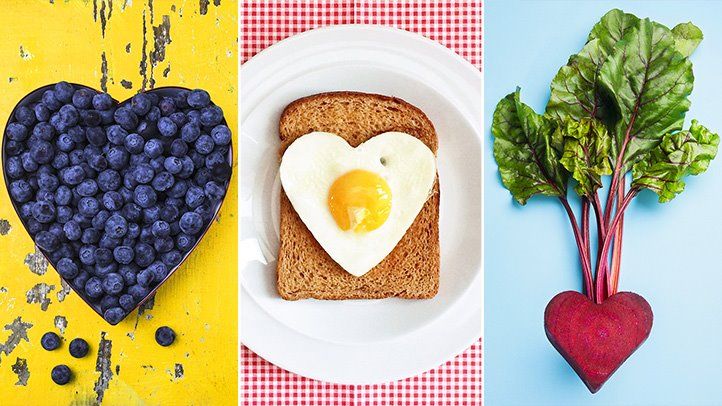Taking care of your heart is vital.
For both men and women, heart disease is the leading cause of death. The CDC estimates that approximately 610,000 Americans die of heart disease each year, or 1 in 4 deaths.
Risk factors for cardiac arrest include coronary artery disease (CAD), peripheral artery disease (PAD), and aneurysms (see below).
Starting a healthy diet is the first step to avoiding these health issues. Experts advise on what foods to eat to protect your heart.

A Heart-Healthy Breakfast Needs Fiber
Breakfast isn’t called the “most important meal of the day” for no reason. To start your day off right, eat foods high in fiber and low in unhealthy saturated fats.
Everyday Health nutritionist Kelly Kennedy recommends fruits, vegetables, whole grains, and fat-free or low-fat dairy for breakfast.
Steel-cut or old-fashioned oats are also a good choice. In addition to being healthy, they will keep you full until lunchtime, says Rebecca Fuller, RD, a cardiovascular intensive care dietitian at the MUSC Heart and Vascular Center in Charleston, SC.
Oats may also help lower blood cholesterol levels, lowering the risk of heart disease, according to Kennedy.
Avoid high-fat breakfast foods like bacon, sausage, waffles, pancakes, and sugary cereals. “All of these can raise bad cholesterol and triglyceride levels,” Kennedy says.
Despite the fact that eggs are high in dietary cholesterol, she says recent research shows that a moderate amount of dietary cholesterol does not raise blood cholesterol levels in most people.
The American Journal of Clinical Nutrition found that eating one egg per day, including the yolk, did not increase the risk of heart disease.
“I think this is a safe number unless a doctor advises otherwise,” Kennedy says. “It’s only average. Three eggs for breakfast twice a week also works. “
Cooking with a little healthy fat, like olive oil, or none at all, like poached or boiled eggs, is preferred.
“Frying eggs in a lot of butter adds all that unhealthy saturated fat,” Kennedy says.
Lunch on Heart-Healthy Fruits and Veggies
Salads, sandwiches, and soups are usually healthy lunch options, but there are some general guidelines.
A Salad is a classic healthy food, but not all salads are equal. “Some salads have 1,000 or more calories,” Fuller says.
She suggests mixing up your salad’s greens and veggies to keep it interesting and heart-healthy. Avoid adding cheese, bacon, and croutons to your salad, which add fat and sodium.
Replace croutons or bacon with nuts or seeds for crunch. The added fat will be less saturated and healthier.
Dressings should be vinaigrettes, with no more than two tablespoons.
Start with whole grain bread and lean meat when making a sandwich. “Be careful with deli meats,” Fuller warns. “Use a low-fat cheese like Swiss, which is naturally sodium-free.”
Pickles and large amounts of condiments can add extra sodium to a sandwich, so avoid them.
Instead, use a little avocado or olive oil mayonnaise, “Fuller suggests.
Soups have a bad reputation for being high in sodium and unhealthy fats. Kennedy recommends a low-sodium broth-based soup as a meal option.
Soups loaded with veggies can fill you up while being low in calories. Choosing a healthy soup can also help you lose weight, keep it off, and lower your blood pressure, cholesterol, and triglycerides.
Dinnertime Greens with Lean Protein
Dinner: aim to have half your plate fruit and veggies.
Choose lean meats like skinless chicken or turkey breast for your meal. If you buy ground meat, Fuller recommends getting meat labeled as 93 or 97 percent lean. portions, or the size of a deck of cards, she advises.
Fish is high in protein and omega-3 fatty acids, which are good for your heart.
Omega-3 fatty acids have been shown to reduce the risk of arrhythmias (abnormal heartbeats) and sudden death, according to the American Heart Association.
Fuller says Omega-3s have anti-inflammatory properties that can help reduce vascular wall inflammation.
She suggests eating fish twice a week. “Start by substituting one red meat meal per week with salmon, tuna, mackerel, or sardines,” she advises.
Avoid fried foods and foods with heavy cream or cheese sauces. Opt for grilled or baked items.
Avoid Junk Food and Eat Heart-Healthy Snacks
Snacking on healthy foods can help satiate hunger and control weight, which is essential for a healthy heart.
Incorporate more heart-healthy fruits and vegetables into your snacks, says Kennedy.
Fuller advises eating foods high in protein and fiber to help you feel full until your next meal.
Some heart-healthy go-to snacks are:
- Apples, oranges, and pears are all examples of fruits.
- Approximately a handful of nuts, such as almonds, cashews, or walnuts.
- Vegetables and hummus.
Processed foods, refined grains, added sugar, and unhealthy saturated or trans fats, such as candy bars, chips, cookies, and baked goods, should be avoided.
Consider a snack as an opportunity to get another serving of a healthy food, rather than a time to indulge, Kennedy advises.

